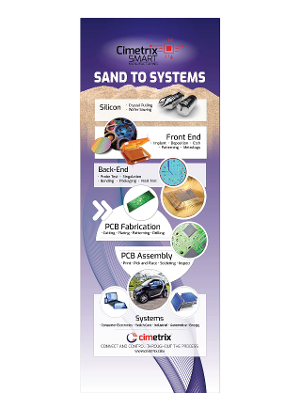 Ask ten different people and you will be told ten different ways to write your resume. Some people say education should be up front, others say to focus on your job history, but the reality is you need to write your resume for those who are going to read it. Your resume isn’t a story about what a wonderful and diverse person you are, it needs to provide information quickly and concisely about your ability to do the job. As a software engineer, the temptation is to write your resume for other engineers, which you should, but you also need to think about everyone who will see your resume. There are three people you should keep in mind when writing your resume:
Ask ten different people and you will be told ten different ways to write your resume. Some people say education should be up front, others say to focus on your job history, but the reality is you need to write your resume for those who are going to read it. Your resume isn’t a story about what a wonderful and diverse person you are, it needs to provide information quickly and concisely about your ability to do the job. As a software engineer, the temptation is to write your resume for other engineers, which you should, but you also need to think about everyone who will see your resume. There are three people you should keep in mind when writing your resume:
- The Human Resources person who will initially look at your resume
- The Hiring Manager who will ultimately decide who to interview and hire
- The Potential Co-Workers on your team, who may contribute to the hiring decision and be involved in the interview
The Human Resources person will most often be the first person who will review your resume. That person will be looking to see if you meet the minimum requirements for the position, such as:
- Do you have the required education?
- Do you have the years of experience?
- Have you worked in this industry before or something similar?
 Sometimes the HR person looking at your resume will be familiar with a few software engineering terms, but their degree is often in a non-technology field. So, the easier you can make it for the person to determine the answers to the above three questions, the better. If your degree is in computer science or a related degree, put that before your job history. This is often an easy hurdle that HR uses to determine who is qualified and who is not, so get it out of the way immediately. As part of your education, list the programming languages you studied and which ones you are proficient in. You might even put in a sentence or two about how any class projects relate to the position you are applying for.
Sometimes the HR person looking at your resume will be familiar with a few software engineering terms, but their degree is often in a non-technology field. So, the easier you can make it for the person to determine the answers to the above three questions, the better. If your degree is in computer science or a related degree, put that before your job history. This is often an easy hurdle that HR uses to determine who is qualified and who is not, so get it out of the way immediately. As part of your education, list the programming languages you studied and which ones you are proficient in. You might even put in a sentence or two about how any class projects relate to the position you are applying for.
BS – Computer Science, Westminster College Graduation Date: 6/1/2018
Proficient in: C++, C#, Java
Studied: Amazon Web Services (AWS), Visual Basic
Completed class project with C# to create an application to manage multiple devices.
Notice in the above example that Amazon Web Services (AWS) is spelled out. Don’t assume your HR person knows all of the common abbreviations in the industry. Spell them out on first usage with the abbreviation in parenthesis. Then you can just use the abbreviation going forward.
Now it is time for work history on the resume. You will want to demonstrate the experience you have that is related to the position. Your job as a stock boy at House of Fabrics when you were a teenager can be left off. When listing job history put the name of the company, years worked, a short sentence about what the company does, and three or four bullets that illustrate experience you obtained that qualified for the position you are applying for. If you are struggling with how to describe the company, look it up on Wikipedia.com. They will often have a one sentence description written for you that you can borrow.
SK Hynix - Software Engineer January, 2001 – March, 2016
Semiconductor supplier of dynamic random access memory chips and flash memory chips.
- Developed C++ application that laser measures the drill depths of holes in circuit boards.
- Worked on a team to create a database of company products that could be accessed via AWS.
- Interacted with customers on installation of support software products, customized in C#.
Finally, if there are particular projects, applications or accomplishments that speak to your ability to perform the job desired, list those in a heading called “Accomplishments.” Remember, the HR person doesn’t care if you were an Eagle Scout, Student Body President or Employee of the Month three times in a row. They are looking to see if you can do the job. Look at the job description and determine if any of the accomplishments you have achieved relate. If so, include them in a couple of sentences.
Accomplishments
- Served on the board of directors of semi.org, and worked with 14 companies on implementation of Generic Equipment Model (GEM) standards.
The second person who will look at your resume is the hiring manager. They are going to be focused on can you do the job required. While the HR Person may understand in general terms what the job does, it is the hiring manager who is closest to the job and can make the judgment call as to who can do the job. The hiring manager is going to be looking to see if you have performed similar work elsewhere of if dissimilar work could actually be translated into similar skills at the new employer. You might illustrate this by putting adding another bullet that illustrates this.
IKEA – Computer Support Technician March, 2016 – June 2018
Designs and sells ready to assemble furniture, appliances and home accessories.
- Provided technical support for store operations employees with desktop and Point of Sale (POS) software.
- Developed enhancement in C#, to POS software, to allow for the automation of the credit card reconciliation process on a nightly basis. This software was required to operate with no user intervention and pull the databases of over 100 stores across the world.
So, while the software enhancement above didn’t make microchips, it did demonstrate your ability to create software with no user interaction, automation, via networking, authored in C#. If you are applying outside of your industry, these explanations become critical so that the hiring manager still considers you a viable candidate.
As with the HR Person, don’t assume the hiring manager was an engineer. Some companies will promote people who are good managers, but not necessarily skilled in the area they are managing. If you can demonstrate your ability to clearly communicate to a layperson, this will be another point in your favor.
Learn about all the career possibilities at Cimetrix!





 Ask ten different people and you will be told ten different ways to write your resume. Some people say education should be up front, others say to focus on your job history, but the reality is you need to write your resume for those who are going to read it. Your resume isn’t a story about what a wonderful and diverse person you are, it needs to provide information quickly and concisely about your ability to do the job. As a software engineer, the temptation is to write your resume for other engineers, which you should, but you also need to think about everyone who will see your resume. There are three people you should keep in mind when writing your resume:
Ask ten different people and you will be told ten different ways to write your resume. Some people say education should be up front, others say to focus on your job history, but the reality is you need to write your resume for those who are going to read it. Your resume isn’t a story about what a wonderful and diverse person you are, it needs to provide information quickly and concisely about your ability to do the job. As a software engineer, the temptation is to write your resume for other engineers, which you should, but you also need to think about everyone who will see your resume. There are three people you should keep in mind when writing your resume: Sometimes the HR person looking at your resume will be familiar with a few software engineering terms, but their degree is often in a non-technology field. So, the easier you can make it for the person to determine the answers to the above three questions, the better. If your degree is in computer science or a related degree, put that before your job history. This is often an easy hurdle that HR uses to determine who is qualified and who is not, so get it out of the way immediately. As part of your education, list the programming languages you studied and which ones you are proficient in. You might even put in a sentence or two about how any class projects relate to the position you are applying for.
Sometimes the HR person looking at your resume will be familiar with a few software engineering terms, but their degree is often in a non-technology field. So, the easier you can make it for the person to determine the answers to the above three questions, the better. If your degree is in computer science or a related degree, put that before your job history. This is often an easy hurdle that HR uses to determine who is qualified and who is not, so get it out of the way immediately. As part of your education, list the programming languages you studied and which ones you are proficient in. You might even put in a sentence or two about how any class projects relate to the position you are applying for. 

 The #MeToo movement has brought the issues of harassment and discrimination to the forefront of American thought. High profile celebrities, business people and politicians have had their illegal behavior exposed as a result of the movement. While the situations generally profiled in the media center around rampant abuse and overtly inappropriate behavior, it is important to consider that not all issues of harassment and discrimination take the form of sexual assault. In fact, sometimes even our best-intentioned behaviors can send the wrong message.
The #MeToo movement has brought the issues of harassment and discrimination to the forefront of American thought. High profile celebrities, business people and politicians have had their illegal behavior exposed as a result of the movement. While the situations generally profiled in the media center around rampant abuse and overtly inappropriate behavior, it is important to consider that not all issues of harassment and discrimination take the form of sexual assault. In fact, sometimes even our best-intentioned behaviors can send the wrong message.
 A small engineering company hired a brand-new engineer from a competitor. He was introduced by management as being “dynamic and creative” and they would see “where he would fit” in the company. The engineer walked around, asked questions, and began to learn about the different projects under consideration and what he might be interested in. During his first month with the company, two of his peers quit. When asked about their reasons for leaving in the exit interview, both felt like that management had hired the new engineer to take their place. In the absence of solid communication from management, two good employees made incorrect assumptions and moved on. It was never management’s intention to replace anyone and the feedback surprised them. Additionally, they were surprised by the fact that the employees didn’t feel comfortable about coming to management and asking about the role of the new engineer. This situation provided a valuable lesson about the importance of open and vibrant communication.
A small engineering company hired a brand-new engineer from a competitor. He was introduced by management as being “dynamic and creative” and they would see “where he would fit” in the company. The engineer walked around, asked questions, and began to learn about the different projects under consideration and what he might be interested in. During his first month with the company, two of his peers quit. When asked about their reasons for leaving in the exit interview, both felt like that management had hired the new engineer to take their place. In the absence of solid communication from management, two good employees made incorrect assumptions and moved on. It was never management’s intention to replace anyone and the feedback surprised them. Additionally, they were surprised by the fact that the employees didn’t feel comfortable about coming to management and asking about the role of the new engineer. This situation provided a valuable lesson about the importance of open and vibrant communication.


